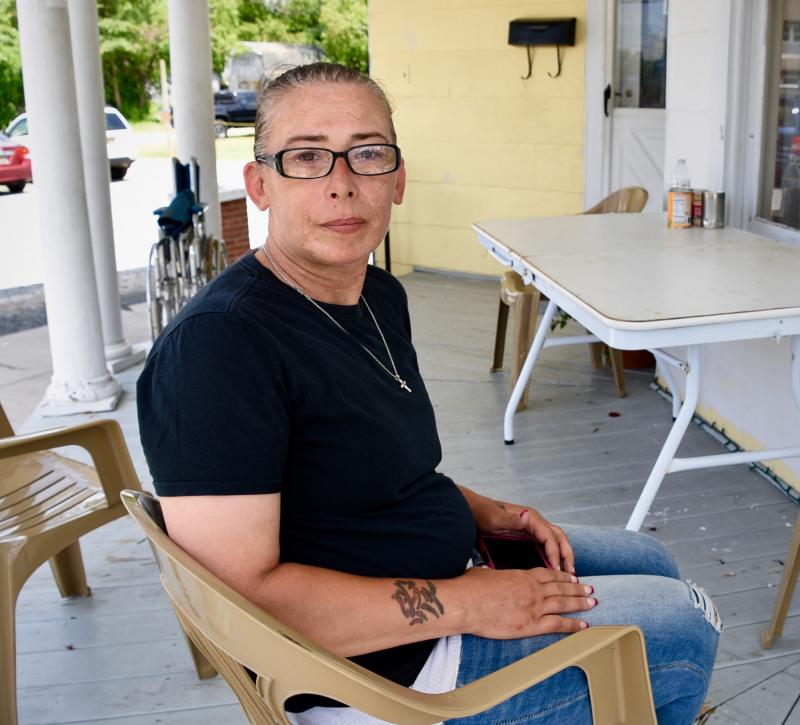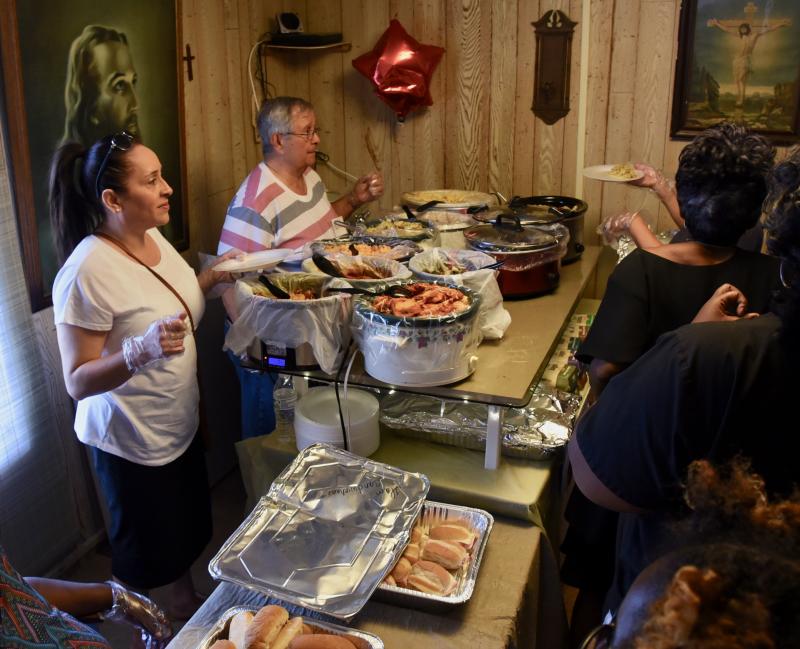Shepherds Office homeless advocate Jim Martin has been speaking to Sussex County Council for weeks representing who he calls the nameless and faceless homeless and working poor. The following is a story of one of those people.
Battling heroin addiction led Sue Gomez down a path to homelessness.
Clean for a year, she is moving from living in a car to living in a tent with friends in an area campground. For her, that is a move up. At least she will have a shower and can sleep without fear of getting hassled by police for loitering.
She'll be a little closer to her job at Allen Harim Foods in Harbeson where she works as much as 11 hours a day, six days week.
The 43-year-old had been living in her fiancé's car since March, moving around the area, but spending most nights in the Milford Walmart parking lot.
She said Milford is the only place she has found where police don't turn homeless people away. She says she wasn't alone in the Walmart parking lot, with as many as a dozen other homeless people sleeping in parked cars on any given night.
On June 20, she left her fiancé after living with him for 13 years. She now will have to rely on her friends, relatives or buses for transportation. “My fiancé enjoys the car life, and he didn't want to make a change. I had to end it. I asked the Lord to guide me in what I should do. I don't want to go down that road again,” she said.
'I lost everything'
“I don't hold anything back; I want people to know my story. I have nothing to hide. I've turned my life to the Lord,” Gomez said. Her normal life went into a spiral after the death of her father from cancer. “I was in pain and was taking Percocet. When I lost my supplier, I got into heroin,” she said.
She was a hardcore addict for four years. “I lost everything – my house, car and family,” she said. She started stealing to support her habit. She spent a year in jail in Maryland on drug charges and then was placed on level three probation for theft charges in Sussex County.
She's been clean for just over one year, going cold turkey on her own. “I will never go back. That drug destroyed me. I have turned to the Lord and thank God every day,” she said.
Because she doesn't have a permanent address, she will need to get someone to drive her to Seaford every Wednesday to meet with her probation officer. “It's hard, but I'm making it. I put myself in this predicament,” she said. “My probation officer does not like the idea that I'm living in a tent. I have no roof over my head now. The devil is trying to beat me down, but I'm too strong for that,” Gomez said.
Living in a car
Living in a car was a terrible existence, she said. “Every one of my nights were almost sleepless because I was worried a cop would knock on the window,” she said. “Your mind is everywhere because you are constantly worried. I can't have any contact with police because of my probation.”
She lacked nearly every basic necessity most take for granted, including a bathroom and a shower. “It's a horrible feeling for anyone in that situation,” she said.
She showered as many times a week as she could at the Georgetown ACE Center and at area campgrounds. In hot weather, her situation only worsened. “We had to run the air conditioner as much as possible, but when we were short on gas, we had to roll down the windows. You get hot, uncomfortable and your legs start to hurt sitting up in a seat,” she said.
Without storage for food, she was forced to eat just about every meal at a fast-food restaurant, which costs at least $20 a day. “That's where most of my money goes, and my health has been going downhill,” she said.
In addition, she's paying off court-mandated fines at $40 per week.
She's been working at the poultry processing plant since January and is trying to save money, but she usually comes up short before payday. She relies on programs for meals such as the Thursday lunch at Shepherds Office in Georgetown. Her immediate goal is to rebuild her credit and rent or purchase a home, but being on probation is a barrier. “Because I'm on probation, no one wants to take a chance on me,” she said.
Gomez has two grown children and a 15-year-old daughter who lives with her father. “I'm trying to rebuild my relationship with my family and working to earn their trust,” she said. “My daughter wants to live with me. I need to be in my kids' lives.”
Homelessness on rise in Sussex County
The Housing Alliance Delaware Point in Time Homeless Count shows a sharp 40 percent increase in the number of homeless in Sussex County, from 118 in 2018 to 181 this year. The annual count was conducted statewide on the night of Jan. 30 into the next morning.
Statewide, the count decreased 15 percent from 1,082 in 2018 to 921 this year.
This year, more than 130 volunteers and Housing Alliance staff counted individuals and families staying in year-round emergency shelters, Code Purple sites, long-term transitional housing and motels. The teams also located and surveyed those categorized as unsheltered living in vehicles, emergency waiting rooms, libraries, train and bus stations, tents, sheds and other places not fit for human habitation. More than 10 percent were unsheltered on a night when the temperature dipped below 5 degrees throughout the state.
New Castle and Kent counties saw decreases of 25 percent and 20 percent. Tina Showalter, alliance spokeswoman, said several reasons contribute to the increase in Sussex, including bad weather during the time of the count.
She said the extremely cold weather encouraged more people to go to emergency shelters and Code Purple shelters where they were more visible to be counted. “The past couple years, it was much warmer and more stayed in their tents and cars,” she said.
Showalter said with more volunteers, the alliance was able to send teams to places not normally visited including hospital emergency rooms and areas where several people were sleeping in their cars overnight, including a grandmother and her grandchildren in the Georgetown Walmart parking lot.
In New Castle County, she said, homeless can remain unseen because there are more options for very cheap places to find one-night refuge that don't exist in Sussex County. Showalter said for the first time, the alliance will conduct a summer count, taking place Thursday, Aug. 8, into Friday, Aug. 9.
Advocate: Many more homeless
Homeless advocate Martin said the count does not come close to the actual number of homeless in Delaware and Sussex County. He said there are thousands in Sussex who are living in their car or couch surfing, those who are staying with friends or relatives, or doubling or tripling up in rentals or houses to avoid sleeping on the streets.
“These stats show just a snapshot of easy-to-find homeless who are visible, but there are thousands who are invisible,” he said.
Martin said the count gives policy-makers an incomplete picture. “People should at least be aware of the limitations of the report,” he said.
Martin said his research shows that nearly 46,000 people in Sussex are impacted by the lack of affordable housing. He lists the following numbers: 1,146 are the chronic homeless; 3,439 are job-seeking homeless; 1,464 are wait-listed homeless; and 29,807 are precariously housed just one unpaid bill, car repair or healthcare bill from being homeless.
He said wait-listed homeless are people living in transitional housing, motels, short-term rentals or on housing waiting lists.



























































